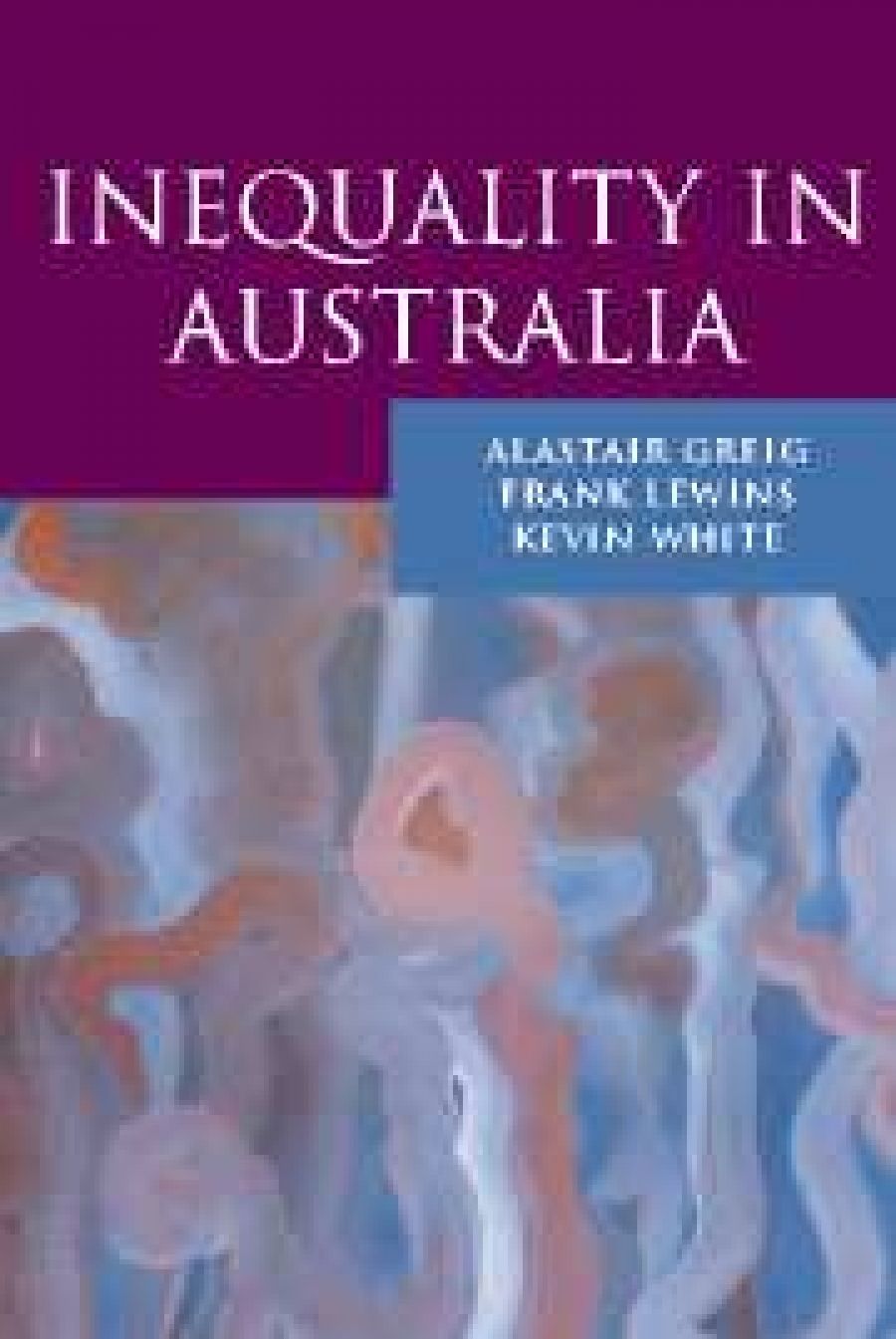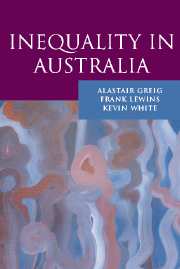
- Free Article: No
- Contents Category: Politics
- Review Article: Yes
- Article Title: Arguing for Equality
- Online Only: No
- Custom Highlight Text:
These two new textbooks on welfare and in-equality admirably reflect the strengths of the Australian teaching and research tradition in these areas. Inequality in Australia bristles with discussions of evidence and empirical data, key points for discussion, boxes with further elaborations, and lists of suggested readings. It takes note of the most important debates about how people actually experience inequality, and emphasises the importance of theory without abandoning a commitment to describing lived experience in concrete terms. Like all compelling sociologies, it connects the incidents and commonplaces of everyday life to concepts such as power, privilege and domination without demeaning the capacities of human actors and without suggesting that we may as well surrender ourselves to ‘hegemonic forces’.
- Book 1 Title: Inequality in Australia
- Book 1 Biblio: CUP, $96 hb, 317 pp
- Book 1 Cover Small (400 x 600):

- Book 1 Cover (800 x 1200):

- Book 2 Title: Australia’s Welfare Wars
- Book 2 Subtitle: The players, the politics and the ideologies
- Book 2 Biblio: UNSW Press, $39.95 pb, 22 pp
- Book 2 Cover Small (400 x 600):

- Book 2 Cover (800 x 1200):

The authors of Inequality in Australia are particularly adept at reading their likely audience. They strike a careful balance between postmodern play and modern seriousness, and make intelligent choices about how to introduce demanding topics to what I expect will be a largely student readership. Their discussions of bodies and ‘identity choices’, for example, focus on self-enactment and its limits, and use relevant, recent examples to draw links to current debates. Chapters on the history of Australian inequality offer a particularly clear analysis of how emerging patterns differ and do not differ from those of the past. In sum, it would be a great pity if this book did not find a place on the Australian non-fiction and even ‘Australiana’ shelves of bookstores, as well as on university course lists. It deserves to be read for its clarity and for its emphasis on how inequality is produced and reproduced in the ways powerful and powerless people think about them-selves. It also stands out for its rigorous examination of the bizarre claims that Australians are now being dominated by a ‘new élite’ of opinion-makers, as opposed to a relatively stable élite of money-changers.
Philip Mendes’s Australia’s Welfare Wars is just as thoroughly connected to practical and political problems. Mendes brings together the fruits of more than a decade of scholarship on welfare, social justice and policy, and successfully marries the insights of the practitioner with those of the social policy analyst. There are careful, comprehensive chapters on the development of Australia’s welfare system and the neo-liberal critique of welfare, all set securely within a global frame. He emphasises Australia’s ineffectual attempts to tackle structural inequalities, and presents a particularly compelling argument against the assumption that welfare reform (which is actually welfare retrenchment) is dictated by abstract ‘globalising’ forces. He shows, in other words, the importance of choices, decisions and negotiations: the welfare states we have are in no small measure the reduced welfare states powerful people wanted us to have. He also recognises the importance of continuing to argue for welfare as it might be – participatory, flexible and principled, for instance – rather than becoming trapped in defending the Welfare State as it has come to be, or once was.
Perhaps the most significant strength of this book lies in its examination of welfare policies and debates within the major political parties and interest groups. Mendes’s judicious analysis of increasing political convergence around targeted welfare and enforced obligation won’t please those who invented or still endorse Labor’s particular version of ‘tough love’ any more than it will please conservatives whose belief in ‘welfare dependency’, ‘welfare fraud’ and the feck-less poor withstands any accidental brush with the evidence. At the same time, he emphasises the importance of new ideas, and old ideas in new packages; he might be critical of adherents of the ‘Third Way’ in social policy, and fearful of a Liberal Party that has marginalised many of its own liberals, but Mendes prefers informed debate to bullying hubris. Australia’s Welfare Wars also pays due regard to the welfare organisations and the churches that are too often sidelined in accounts of welfare policy. As such, it is a particularly important contribution to our understanding of how welfare policies have to be made – and remade – through good arguments and advocacy. While Mendes is no idle gazer into the beyond, his comments on plausible arguments for the welfare state, and for a combination of global ‘social rights’ and local ‘social justice’, are a provocative contribution to a still rather halting Australian debate on such questions.
While these books are particularly valuable as textbooks, and as introductions to the most important debates in their fields, they also bring their readers to a kind of threshold, beyond which we must strive to reach. In part because they are textbooks, they describe but cannot resolve some key difficulties in our thinking and writing about inequality, poverty and welfare. For instance, each points out that careful studies of the victims of class, gender and racial inequalities – or of inadequate welfare policies – are not matched by studies of those who produce, maintain and defend those inequalities or those policies. In terms of inequality’s perpetration and perpetuation, we need to know more about who benefits. There is yet another inquiry into poverty. All well and good, perhaps, but what might be even better is an inquiry into wealth.
Both books also gesture towards questions that need to be pursued in more focused and less general studies: has welfare lost its legitimacy among voters, for example? Do most ‘ordinary Australians’ care little for the sufferings of others, when studies of public opinion on both issues suggest deep ambivalence and even contradiction? Is there no electoral constituency for social justice or measures to promote equality? Or, as some overseas research suggests, is the more significant problem finding the words to galvanise and mobilise a widely held desire to act justly towards others? What might be those words, those moral arguments, and who might best speak them? Would they focus on risk, and shared vulnerabilities, the kindness and justice owed to others, known and unknown? What kinds of evidence, and what means of presenting it, might point out the inherent dangers of seeking ever more exclusive guarantees of safety and success for yourself and those close at hand, regardless of the cost to other people? How do we argue against different kinds of inequality and describe the forms of equality that might take their place?
Of course, such questions will not brook easy or half-baked answers. At least further explorations can begin on the solid foundations these books provide, the knowledge they create, and the tools they place in the hands of their readers.
And let’s hope in turn that scholars and commentators listen to Mendes’s call for social democrats to ‘develop new ideas and initiatives for regenerating the welfare state’. We might add some even more difficult tasks, such as listening for – and helping to mobilise – a concern for justice, equality and decent welfare that is perhaps more resilient than many people dare to believe.


Comments powered by CComment